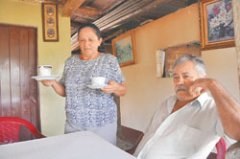7 Xunweng self-taught to grow A-grade coffee beans
Tseng Liang-hsiung, who retired from a telecommunications engineering unit at the age of 70, grew coffee in 5% of Arabica seven years ago in his hometown of Zhuzai Mountain in Puli, Nantou. He continued to study and improve cultivation techniques, and became a "zero-return" urban farmer. Last year, when he participated in the evaluation of fine coffee in Central China, he won the "second prize" and won the honor of "A coffee is unusual".
Referring to the story of cultivating coffee, Tseng Liang-hsiung said briskly that before he retired, he was engaged in engineering and business, and the ancestral woodland was allowed to be desolate until the forestry unit informed that this state-owned woodland needed afforestation or cultivation, otherwise it would have to be recovered.
Before growing coffee, Tseng Liang-hsiung drank follicular coffee only a few times, leaving unforgettable memories of mellow and memorable coffee, but he has never seen coffee planting, let alone how to cultivate and manage it.
Tseng Liang-hsiung said that after Taiwan's local production of Gukeng coffee became famous, farmers in low-altitude mountain areas in various counties and cities began to grow coffee crops.
In order to convert woodland into coffee, Tseng Liang-hsiung sought guidance from many agricultural and academic units, and even had to wait in line to buy coffee seedlings because farmers were involved in growing coffee. fortunately, he still put in patiently with enthusiasm, while self-study, while obtaining agricultural testing institutes and other scholars and experts to guide cultivation and management techniques.
Growing coffee is not easy to get "every grain is the hard work of farmers". Tseng Liang-hsiung and his wife drive from Taichung to Nantou Coffee Garden every day to take care of coffee saplings.
Zeng Liangxiong said that in the fourth year, coffee seedlings had to be "thinned" and inexperienced in picking. The coffee beans taken out were jokingly called "moldy" by their peers. Only after asking for advice modestly did they know that ripe red coffee beans were slowly picked "one by one" according to the ripening process, and after harvest, they had to go through complicated peeling, fermentation, drying, and baking processes.
Only by insisting on organic cultivation can the quality of coffee be affirmed by customers.
Tseng Liang-hsiung says that coffee crops are half-sunny, and he grows banana trees in the forest gap to cover the shade, and flowers are several times more expensive than chemical fertilizers. Tseng Liang-hsiung, who won the prize and suggested raising the price, still insists on a price of NT $1000 per pound to be a down-to-earth and happy "urban farmer."
Important Notice :
前街咖啡 FrontStreet Coffee has moved to new addredd:
FrontStreet Coffee Address: 315,Donghua East Road,GuangZhou
Tel:020 38364473
- Prev

Coffee bean taste experience-coffee scents around big cities and towns
Coffee beans are an excellent companion gift in Colombia. the coffee industry, which is endorsed by the government, allows tourists to taste the best coffee beans in South America, delve into the exquisite coffee culture, and of course buy a few bags of cheap coffee beans to go home. In big cities and towns in Colombia, many office workers or students are often seen hurrying down the street to catch buses with a cup of coffee in one hand.
- Next

Cafe owner vs. Science and technology upstart
One weekend afternoon, I saw a cafe by the side of the road. The window furnishings caught my eye. A handsome young boy immediately came out to greet me and introduced how mellow and delicious their coffee was. I don't usually have the habit of drinking coffee, and I don't have any special research on coffee, so I asked him to make me a cup of mellow coffee. Soon after, the coffee was brought. He asked me
Related
- What is the difference between Indonesian Sumatra Mantinin coffee and gold Mantinin? How to distinguish between real and fake golden Mantelin coffee?
- What does bypass mean in coffee? Why can hand-brewed coffee and water make it better?
- Unexpected! Ruixing Telunsu lattes use a smoothie machine to foam milk?!
- % Arabia's first store in Henan opens into the village?! Netizen: Thought it was P's
- Does an authentic standard mocha coffee recipe use chocolate sauce or powder? Mocha Latte/Dirty Coffee/Salty Mocha Coffee Recipe Share!
- What is the difference between Vietnam egg coffee and Norway egg coffee? Hand-brewed single product coffee filter paper filter cloth filter flat solution!
- What is the difference between sun-cured and honey-treated coffee? What are the differences in the flavor characteristics of sun-honey coffee?
- How to make Italian latte! How much milk does a standard latte use/what should the ratio of coffee to milk be?
- How to make butter American/butter latte/butter Dirty coffee? Is hand-brewed coffee good with butter?
- Is Dirty the cold version of Australian White? What is the difference between dirty coffee/decent coffee and Australian white espresso?

